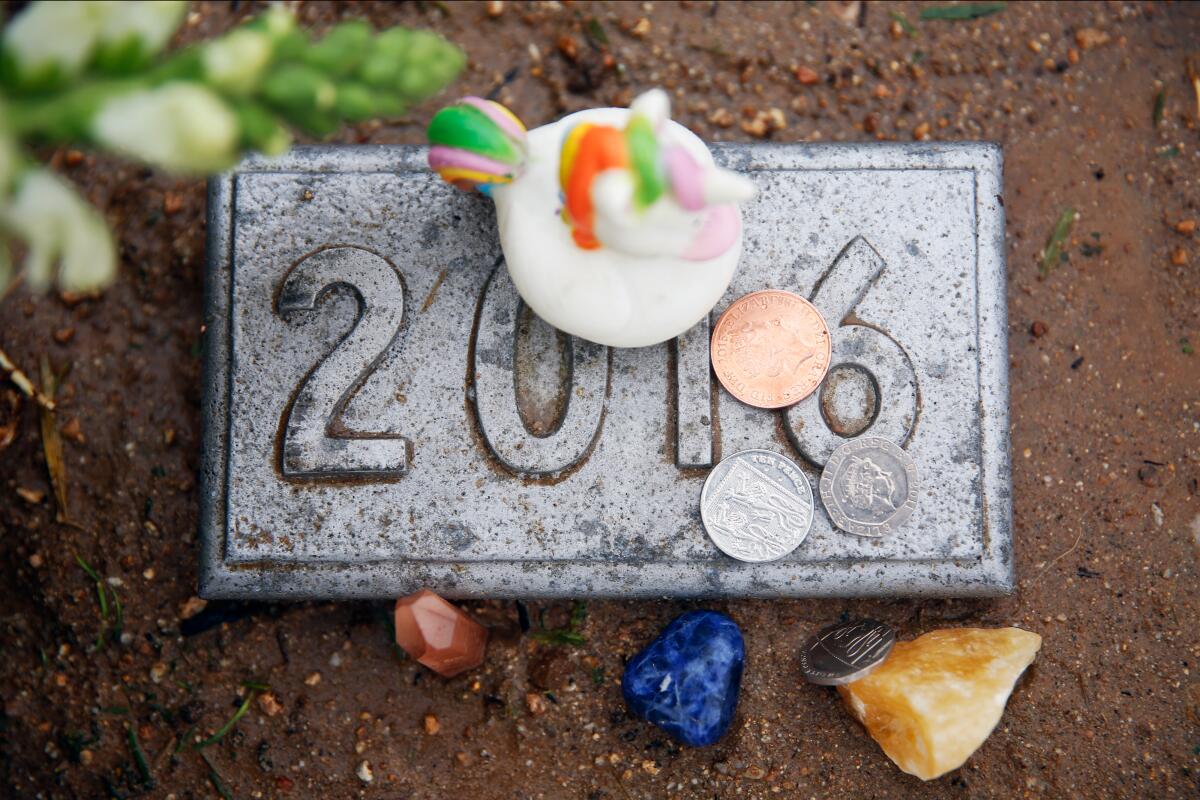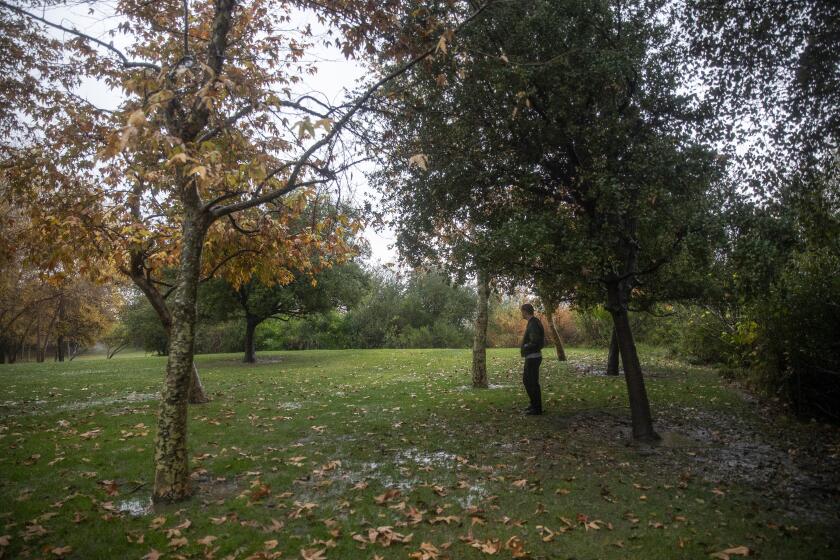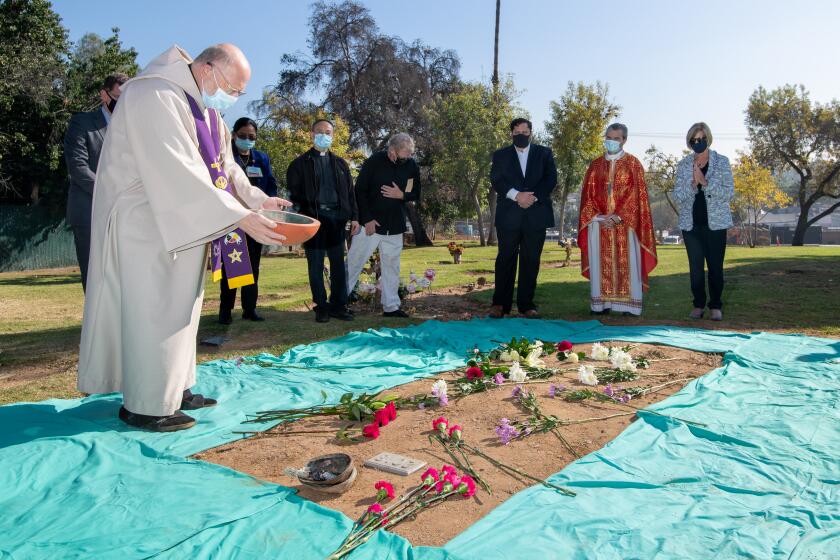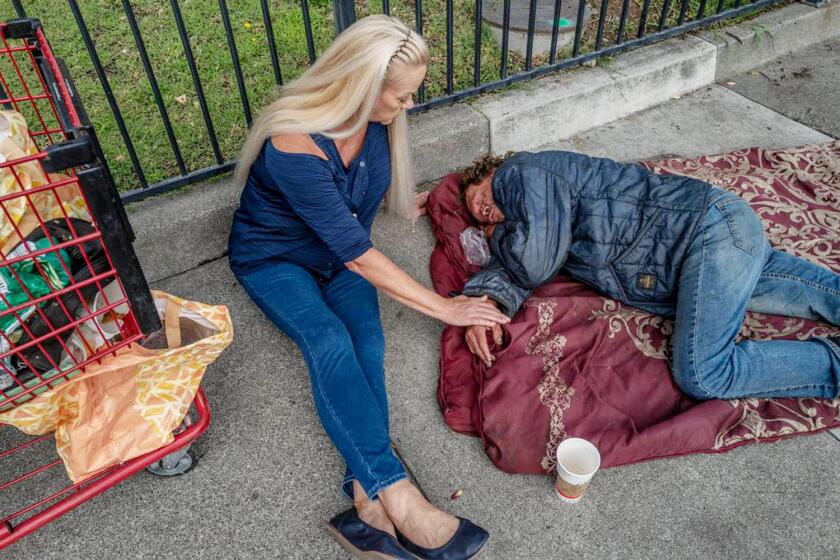Opinion: Why are more Americans dying alone?

- Share via
Lena Brown’s lonely ending forewarns a future of death in America. She’d built a middle-class life in Hawthorne as a widow with no children. Her niece and nephew moved her to a nursing home when she was 93. They soon stopped visiting. Six years later, Brown died. Calls and letters from local officials to her relatives went unanswered. L.A. County cremated Brown and buried her ashes in a mass grave alongside those of nearly 1,500 other Angelenos, marked only by a small stone engraved with the year of death.
The poor have always been more likely to end up in unmarked graves, previously known as “potter’s fields.” But today, people who once had jobs, homes and families are meeting a similar end. While no federal agency keeps track of the number of unclaimed bodies, local data from across the U.S. suggest that an estimated 2% to 4% of people who die every year in the United States now go unclaimed, up to 148,000 people annually.
Opening a room in your home to someone is a generous act that can benefit hosts and guests alike.
We have spent eight years studying the unclaimed of L.A. County, trying to understand who they are, why they are being abandoned and what accounts for their rising numbers. Some observers are inclined to attribute the rise in unclaimed bodies to the costs of funerals, but over 40 years, the number of L.A.’s unclaimed has not fluctuated with poverty levels.
In L.A. County, the most populous county in the U.S., the unclaimed constituted just 1.2% of adult deaths in the 1970s. By the early 2000s, they made up 3% — and that number has continued to rise. In Maryland, one of the few states to keep track of unclaimed deaths, the percentage of adults and infants going unclaimed has more than doubled in 20 years, from 2.1% in 2000 to 4.5% in 2021. Coroners and medical examiners across the U.S. have run out of space to store abandoned bodies. It is a quiet epidemic, says Megan Smolenyak, founder of a group of volunteer genealogists who help locate kin.
Young men, who tend to be more progressive than their elders, are the most isolated. Boys are retreating into the manosphere for reasons beyond addictive technologies.
There have been other periods when the number of people who didn’t receive a proper burial increased, but there were exceptional circumstances such as the Civil War, the Spanish flu and Hurricane Katrina. (Initial research indicates the COVID-19 pandemic also increased unclaimed deaths.)
We found that something fundamental has changed in America’s families, however, leading to an uptick even when conditions are normal.
In almost all cases in L.A., when government agencies are called in to pick up bodies at residences or on the street, they locate next of kin after sleuthing in databases. But many family members refuse to claim their dead relatives. We encountered countless reasons: A husband has left his family, siblings have grown bitterly at odds, an uncle has lost touch. In an era of growing polarization over politics, faith and sexuality, parents and adult children often feel as if they have no choice but to cut off contact. The opioid epidemic and untreated mental illness also strain kin ties beyond repair. On paper, these families are still a unit, but they no longer support one another. In other cases, families are split up through incarceration or the foster care system.
In a 30-minute ceremony, Los Angeles County officials and interfaith leaders honored the dead in English, Spanish, Ukrainian and Vietnamese.
Demographic trends show that the close-knit family structure that once protected people from going unclaimed no longer prevails. The share of American households made up of married couples with children under 18 dropped from 44% to 19% between 1960 and 2017, while the proportion of American adults living alone is more than double what it was 60 years ago. Kin disconnection likely will increase as baby boomers age, given that more than 1 in 4 boomers are divorced or never married and more than 1 in 6 live alone. Demographers predict a coming generation of “kinless seniors” a million strong, without partners or spouses, children or siblings.
With family ties withering, other types of bonds are becoming more important, in ways that our current laws fail to account for. We have been struck by the energy and resources that authorities have devoted to locating a deceased person’s next of kin and — if the family refuses to claim them — disposing of the remains. But government officials often stand in the way of friends and chosen family who want to claim the body, for the simple reason that they don’t meet the strict legal interpretation of “next of kin.”
CARE Court, California’s plan for helping those with severe mental illness, is under attack by civil rights groups. But families fighting to help their loved ones say compassion demands intervention.
Laws should recognize the deeply meaningful connections of alternative family forms, such as cohabitation, companionship after divorce, deep friendship and involvement in religious groups. Broadening a sense of family at critical passages such as death can widen a sense of community in life.
We also need to heed Surgeon General Vivek Murthy’s call to fight the epidemic of loneliness and social isolation, by prioritizing policies that better nurture connections, provide equitable access to social infrastructure and foster belonging. If we don’t take steps to reduce isolation, Murthy warns, “We will continue to splinter and divide until we can no longer stand as a community or a country.” Widening policies for paid family leave and building cities with functioning public transportation systems are ways to support social connections. Keeping in touch with those you care about may turn out to be the simplest insurance policy against abandonment at death.
Abandoned bodies and lonely funerals are predictable outcomes of a society gripped by extreme estrangement and social isolation. All signs suggest that the numbers of unclaimed will continue to rise, and those at risk already dwell among us.
Pamela Prickett is an associate professor of sociology at the University of Amsterdam. Stefan Timmermans is a professor of sociology at UCLA. They are co-authors of the recent book “The Unclaimed: Abandonment and Hope in the City of Angels.”
More to Read
A cure for the common opinion
Get thought-provoking perspectives with our weekly newsletter.
You may occasionally receive promotional content from the Los Angeles Times.














